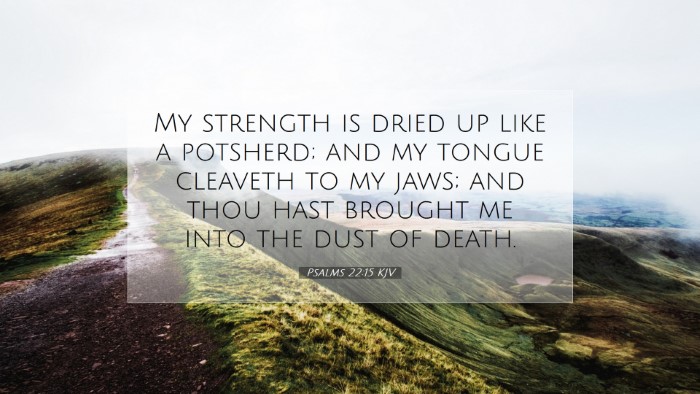Psalms 22:15 - Commentary and Insights
Verse Text: "My strength is dried up like a potsherd; and my tongue cleaveth to my jaws; and thou hast brought me into the dust of death." (Psalm 22:15, KJV)
Context and Overview
Psalm 22 is a profound and poignant psalm attributed to David, expressing deep anguish and a sense of abandonment yet culminating in a declaration of trust in God.
This particular verse falls within a section of the psalm where the psalmist articulates his physical and emotional suffering, reflecting a state of desperation.
In this cry of affliction, the imagery used by the psalmist vividly conveys the extremity of his distress. Understanding the context is crucial for unpacking its theological implications.
The psalm is often regarded as prophetic, foreshadowing the suffering of Christ during His crucifixion. Therefore, this verse invites deeper reflection on both personal suffering and messianic fulfillment.
Insights from Matthew Henry
Matthew Henry highlights the physical metaphors within this verse. He explains that being "dried up like a potsherd" signifies utter desolation—a state where vitality and strength are depleted.
The imagery of a potsherd implies fragility and worthlessness, drawing a parallel to the psalmist's feelings of insignificance amid pain.
He further elaborates on the expression, "my tongue cleaveth to my jaws," indicating a parched mouth, a symptom of severe thirst and distress.
In the ancient Near Eastern context, thirst is often a metaphor for deep longing, either for physical water or spiritual sustenance.
Henry posits that this reflects the yearning for divine presence that seems absent in times of suffering.
Insights from Albert Barnes
Albert Barnes provides a scholarly perspective on this verse, emphasizing the psychological torment experienced by the psalmist.
He breaks down the significance of "thou hast brought me into the dust of death," noting that it speaks to a transition from life to the brink of death, symbolizing despair.
Barnes also draws attention to the relational dynamic with God, where the psalmist feels abandoned. This sense of divine distance is exacerbated by the intensity of suffering.
He adds that the imagery portrays a profound surrender to mortality, yet suggests an underlying faith, which conveys that the psalmist still addresses God despite the evident turmoil.
Insights from Adam Clarke
Adam Clarke's commentary takes a more linguistic approach, analyzing the Hebrew terms used in this verse.
He notes that "potsherd" (Hebrew: cheres) denotes something that has been shattered and can never regain its original form, symbolizing the ultimate vulnerability of the human condition.
Clarke expands on the term "dust" as it is used throughout the Scriptures. He suggests that "to be brought into the dust of death" can indicate both a literal death and a spiritual state of degradation.
He highlights the biblical motif that emphasizes humanity's fragility and the inevitable return to dust, as seen in Genesis 3:19.
Theological Reflections
This verse encapsulates themes of suffering, abandonment, and human frailty. It invites meditation on the dual aspects of divine sovereignty and human despair.
The stark depiction of a parched throat and a broken spirit resonates with the disillusionment many experience in their spiritual journey, especially in times of trial.
-
The Nature of Suffering:
The verse provides insight into the nature of suffering, articulating a prayer that may seem absent of hope but paradoxically expresses a continuous relationship with God.
-
Messianic Foreshadowing:
The prophetic dimensions of this psalm tie it to Christ’s physical suffering, aligning with the New Testament revelation of His anguish on the cross.
-
The Search for Divine Presence:
The longing for God amidst suffering emphasizes the believer's need for divine companionship, suggesting that even in despair, one can still call upon God.
Practical Applications
For pastors, students, and scholars, this verse serves as a profound reminder of the realities of suffering in the human experience.
It invites pastoral care approaches that validate the anguish of those in distress, modeling empathy and support as the psalmist does through his laments.
Students of theology can explore the duality of suffering and faith, fostering a deeper understanding of how Scripture navigates human emotions.
This verse challenges them to contemplate how the language of lament connects to their own theological frameworks.
For theologians, the exegetical exploration invites a robust dialogue on the nature of God’s presence during times of suffering.
The connections to the New Covenant enrich discussions on Christ's suffering and its implications for salvation and the believer’s relationship with God.
Conclusion
Psalm 22:15 is a deeply affecting verse that speaks not only to the suffering individual’s experience but also to the overarching narrative of faith, hope, and redemption.
The insights from historic commentaries reveal a rich tapestry of meaning that continues to resonate with believers today.
Engaging with this text offers an opportunity for spiritual reflection and encourages a heartfelt pursuit of God even amidst the darkest moments.
This psalm serves as a testament to the enduring nature of faith, reminding believers that, in their weakest moments, they can still reach out to the Almighty.


